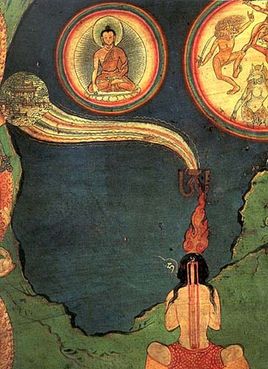The Tibetan Practice of Phowa I

 Death is inevitable, but how you die - terrified and confused, or with confidence and spiritual mastery - is within your control. ~Choeje Ayang Rinpoche
Death is inevitable, but how you die - terrified and confused, or with confidence and spiritual mastery - is within your control. ~Choeje Ayang Rinpoche
The Tibetan tradition of Phowa offers a simple, powerful preparation to aid those who are transitioning from this world to another state of consciousness. It is an influential practice for those who are sick, and it is also very valuable to those who are healthy, as an auxiliary technique to our spiritual evolution. The practice is designed to prepare the person for their actual time of death.
Phowa is a Tibetan term which can be translated as "Practice of Conscious Dying" or "Transference of Consciousness at the Time of Death". This practice is one of the six Yogas of Naropa, a meditational technique that anyone can do regardless of their creed. It can be done also for those who have already departed this life, as well as for those of us who are healthy, in preparation for our death. It is a very simple, fast, efficient practice that brings an immediate healing into our lives. As an advanced yogic practice, the Phowa meditation of Dzogchen was used by followers of the Vajrayana. The main purpose of Phowa is to prepare for the transference of consciousness at the moment of death through the energetic fontanels on top of the head, to ensure its merger with the wisdom mind of the Buddha.
In the view of Tibetan Buddhism, the consciousness leaves the body after death through any of nine orifices (eyes, ears, nose, mouth, urethra or anus). These are also considered to be gateways to the respective six traditional rebirth areas. It is believed that monks and nuns are free to choose their next life reincarnation. In Tibet, the sign of a successful Phowa practice is the leakage of a drop of blood or secretions directly from the center of the crown.
From the Buddhist perspective, learning Phowa allows one to be reborn in one of the higher worlds and effectively to go beyond Samsara. From the point of view of vibrational medicine, the regular practice of Phowa brings fearlessness and confidence when one is approaching their own death. It also helps to alleviate the suffering of those who are in pain while dying.








